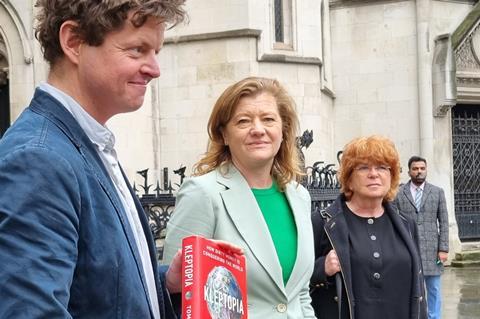A leading media lawyer has said the UK must pass so-called anti-SLAPP legislation after a libel claim against a Financial Times journalist over his book about ‘dirty money’ collapsed today.
Caroline Kean, a partner at Wiggin, told the Gazette that Eurasian Natural Resources Corporation’s case against Tom Burgis was an ‘egregious form of lawfare’, describing it as ‘one of the most blatant’ examples of a strategic lawsuit against public participation (SLAPP) she had ever seen.
She also said that a ‘cross-party group of MPs’ is currently working on anti-SLAPP proposals, and that any legislation should ‘go further’ than the system currently in place in the US.
‘I think it is the time because what we are seeing [in Ukraine] is what happens if you do not protect freedom of speech and if you do not give [journalists] the tools to expose corruption,’ Kean added.
She successfully defended Burgis in a libel claim brought by Kazakh-based mining giant Eurasian Natural Resources Corporation (ENRC) over his 2020 book Kleptopia: How Dirty Money is Conquering the World.
ENRC sued Burgis and publisher HarperCollins over ‘very serious’ allegations made in Kleptopia, which the former FTSE 100 company said means that it had three people murdered ‘to protect its business interests’ – claims which are ‘highly disputed’.
However, Mr Justice Nicklin today ruled that the claim must be dismissed as references to the three alleged murders and an alleged poisoning would not be taken by an ‘ordinary, reasonable reader’ to refer to ENRC. ‘Only individuals can carry out acts of murder or poisoning, only individuals can be motivated to do so to protect their business interests,’ the judge said.

He concluded: ‘It would appear to me that the consequence of this ruling is that the claimant’s case must be dismissed.’
ENRC’s barrister Adrienne Page QC sought permission to appeal, arguing that Nicklin’s decision was ‘plainly wrong’, adding: ‘Your lordship has, in effect, misunderstood what the meaning is that is complained of, namely that the corporation was implicated in having these people murdered.’
Nicklin refused permission and ordered ENRC to make an interim payment on account of £50,000.
Speaking outside the Royal Courts of Justice in London, Burgis said he was ‘delighted’ with the result. He also said that the ongoing invasion of Ukraine is a ‘brutal, bloody new front in a war that has been going on for a very long time … against democracy by kleptocrats’.
‘What the terrible suffering of people in Ukraine is showing us today is that the war is very real and, if we are going to fight it, we have to defend against corruption,’ he added.
Arabella Pike, publishing director at HarperCollins imprint William Collins, said law firms representing clients in apparent anti-SLAPP cases need to ‘find out where the money is coming [from] to pay their fees’.
A spokesperson for ENRC said: ‘The allegations made by HarperCollins, Financial Times and Tom Burgis are completely false and continue to cause damage to the company’s reputation. We are considering our options following today’s judgment.’
This article is now closed for comment.



























8 Readers' comments